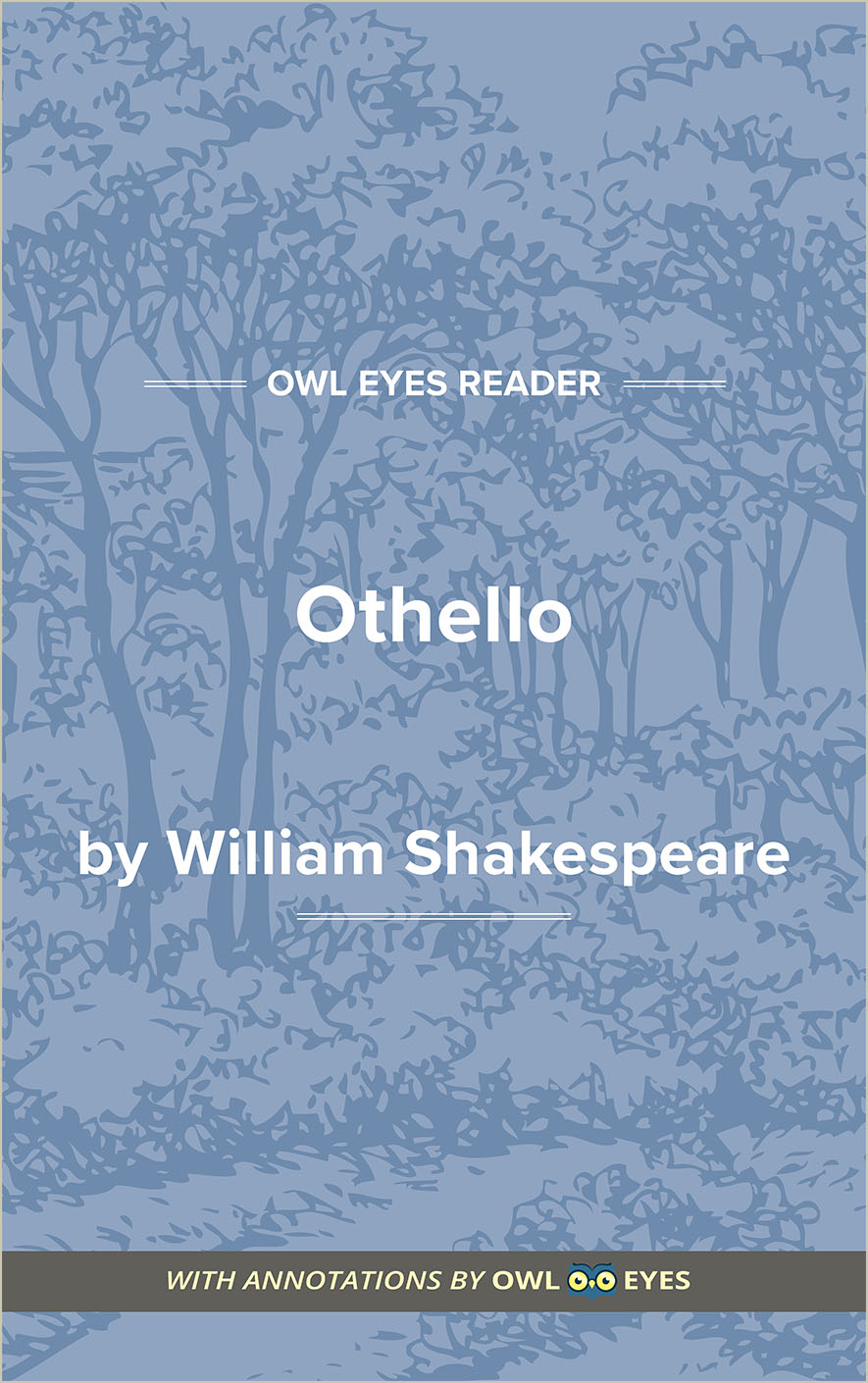Analysis Pages
Metaphor in Othello
Throughout Othello, Shakespeare puts his talent for diverse metaphors to use. Most often, metaphor is used to convey a character’s complex emotional state, particularly in the content of interpersonal relationships. For example, Brabantio uses the metaphor of a jewel to describe the two roles Desdemona plays in his life, as beloved daughter and as possession. Another example is Othello’s characterization of himself as a falconer to Desdemona’s falcon; he wishes to let her fly freely, but she is tethered to his heart.
Metaphor Examples in Othello:
Act I - Scene I
🔒"an old black ram Is tupping your white ewe...." See in text (Act I - Scene I)
"spinster..." See in text (Act I - Scene I)
Act I - Scene III
🔒"I have't. It is engender'd. Hell and night Must bring this monstrous birth to the world's light...." See in text (Act I - Scene III)
"If virtue no delighted beauty lack,(310) Your son-in-law is far more fair than black...." See in text (Act I - Scene III)
"For your sake, jewel,..." See in text (Act I - Scene III)
"Take up this mangled matter at the best:(185) Men do their broken weapons rather use Than their bare hands...." See in text (Act I - Scene III)
Act II - Scene I
🔒"If after every tempest come such calms, May the winds blow till they have waken'd death! And let the laboring bark climb hills of seas Olympus high, and duck again as low(200) As hell's from heaven! If it were now to die, 'Twere now to be most happy; for I fear My soul hath her content so absolute That not another comfort like to this Succeeds in unknown fate...." See in text (Act II - Scene I)
"It gives me wonder great as my content(195) To see you here before me. O my soul's joy! If after every tempest come such calms, May the winds blow till they have waken'd death! And let the laboring bark climb hills of seas Olympus high, and duck again as low(200) As hell's from heaven! If it were now to die, 'Twere now to be most happy; for I fear My soul hath her content so absolute That not another comfort like to this Succeeds in unknown fate...." See in text (Act II - Scene I)
"If she be black, and thereto have a wit, She'll find a white that shall her blackness fit...." See in text (Act II - Scene I)
"What ribs of oak, when mountains melt on them, Can hold the mortise?..." See in text (Act II - Scene I)
Act III - Scene III
🔒"Whose icy current and compulsive course Ne'er feels retiring ebb, but keeps due on To the Propontic and the Hellespont,(505) Even so my bloody thoughts, with violent pace, Shall ne'er look back, ne'er ebb to humble love,..." See in text (Act III - Scene III)
"that was as fresh As Dian's visage, is now begrimed and black(430) As mine own face...." See in text (Act III - Scene III)
"Avaunt! be gone! Thou hast set me on the rack: I swear 'tis better to be much abused(375) Than but to know't a little...." See in text (Act III - Scene III)
"Though that her jesses were my dear heartstrings, I'ld whistle her off and let her down the wind To prey at fortune...." See in text (Act III - Scene III)
Act III - Scene IV
🔒"What, keep a week away? seven days and nights? Eight score eight hours? and lovers' absent hours, More tedious than the dial eight score times?..." See in text (Act III - Scene IV)
"A liberal hand. The hearts of old gave hands; But our new heraldry is hands, not hearts...." See in text (Act III - Scene IV)
Act IV - Scene I
🔒"Goats and monkeys!..." See in text (Act IV - Scene I)
"This is some minx's token, and I must take out the work?..." See in text (Act IV - Scene I)
"and thither comes the bauble,..." See in text (Act IV - Scene I)
"Think every bearded fellow that's but yoked May draw with you. There's millions now alive That nightly lie in those unproper beds Which they dare swear peculiar...." See in text (Act IV - Scene I)
"O, it comes o'er my memory, As doth the raven o'er the infected house, Boding to all..." See in text (Act IV - Scene I)
Act IV - Scene II
🔒"You, you, ay, you!(105) We have done our course; there's money for your pains:..." See in text (Act IV - Scene II)
"No, as I am a Christian. If to preserve this vessel for my lord From any other foul unlawful touch Be not to be a strumpet, I am none...." See in text (Act IV - Scene II)
"Was this fair paper, this most goodly book, Made to write “whore” upon?..." See in text (Act IV - Scene II)
Act V - Scene II
🔒"O Spartan dog, More fell than anguish, hunger, or the sea! Look on the tragic loading of this bed; This is thy work...." See in text (Act V - Scene II)
"If heaven would make me such another world Of one entire and perfect chrysolite, I'ld not have sold her for it...." See in text (Act V - Scene II)
"Not Cassio kill'd! Then murder 's out of tune, And sweet revenge grows harsh...." See in text (Act V - Scene II)
"It is the very error of the moon;(130) She comes more nearer earth than she was wont And makes men mad...." See in text (Act V - Scene II)
"For to deny each article with oath Cannot remove nor choke the strong conception That I do groan withal. Thou art to die...." See in text (Act V - Scene II)
"When I have pluck'd the rose, I cannot give it vital growth again..." See in text (Act V - Scene II)

